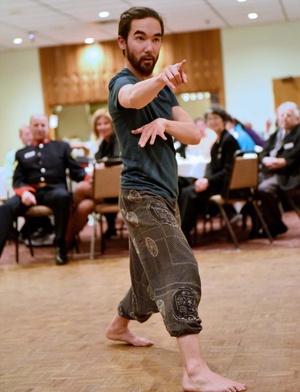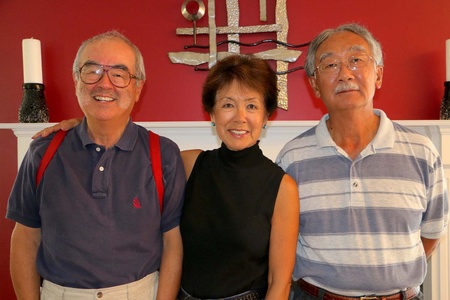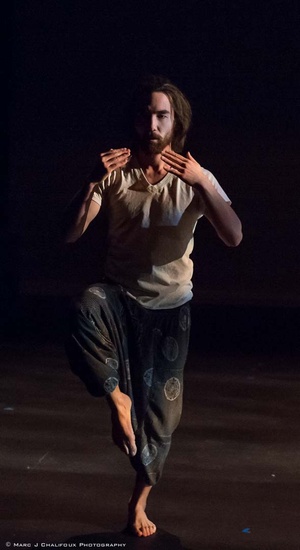As a Sansei storyteller, can you comment on the importance of telling our own stories in order to learn and grow from those of our parents and grandparents?
That experience is what has kick-started this newest leg of the journey I’m on with Sansei.
I would really like to be able to take it into schools and have these same kinds of conversations with students.
Any success with this?
Still a work in progress. Many schools have expressed interest, and we are still trying to find the right funding / production opportunity to maximize the engagement.
I see how important it is not to forget this part of Canada’s history.
What is the value of not forgetting the JC Internment experience for non-JCs?
When I began, I thought this may be a ‘parlour piece’ something that was important for me to do for myself, and to research if the method of mixing dance / theatre / poetry would work. But this process has drawn me closer to so many members of my community, people who had stories about their grandparents in the war, about overcoming stereotypes, about how to acknowledge past abuse without turning to blame or hate. The performance allows people to “look twice” at something they might not have grasped. To “look twice” is in the etymology of respect; a practice in respect will help us find a stronger community, it will discourage the “us” vs “them” mentality, which seems to be really necessary with a lot of the pain and hate that is getting mainstream media attention in North America.
Can you please tell us what the Sansei story is that you are telling through your performance? Is it a dance piece?
The performance weaves together three stories: the historical background of the Japanese Internment in Canada, my own immediate family, and a beautiful family legend of a samurai on my grandmother’s side of the family.
I tell these stories through storytelling and theatre; dance and movement; spoken word poetry. The performance also includes interviews with my Uncle, Aunt and father of their own experiences. The combination of these mediums allows me to present themes of resilience, acceptance, and truthiness.
Can you share something from the performance?
Edward's Hummingbird (recorded interview)
We were sent away, we were living in this house, and it was sort of a camp.
I don’t know how, but I found this hummingbird, I’m sure I didn’t catch it, so I must have somehow got it, maybe it was not well and I put it in my shirt pocket, and of course I was all excited and I ran home to show my mother, but I guess running home in my shirt pocket maybe it was sick I don’t know, but I never did find it again…
To me, that hummingbird is the perfect metaphor for the Japanese during this time. All the hopes, dreams, and honour just… (gone).
There was never one charge laid upon anyone in the internment process, or the years of internment, and labour camps.
But the cost of the housing, feeding, and detention of all these people had a cost. One particularly savvy, and particularly racist politician named Ian Mackenzie, push a bill through Parliament to sell Japanese belongings, properties, cars, boats, and everything that was being saved for them, in order to pay their camping fees.
For Canada, it was a win-win - more money, less Japanese, new towns were founded, the Albertan sugar industry was saved, the Hope-Princeton highway was built on slave labour, and come on, can you really put a price on homeland security?
But now imagine... Imagine, walking through the archway into the holding facility in the Hastings St horse barns, or at camp TASHME, or a POW Camp in Ontario. Imagine that feeling knowing that “When we enter this gate, we shall never be allowed to leave again until the war is over. Let’s remember this feeling. This is an event we will never experience again during our lifetime. Let's remember.”
Can you give me a little context here, please? Who is Edward?
Edward is my uncle, this is good story about finding, and the loss of his first pet - a hummingbird he found in an internment camp in New Denver.
This story is a bit of a motif, I repeat it later in Japanese (that I've learned phonetically) and in movement.
Very powerful…. Anything else?
Here is one of the spoken word pieces I perform during the piece, they are the only other ones I could see fitting.
i’m not good at looking back, remembering what was
i used to think it was learned behaviour to savour the now,
be present in the present once the past has past
i used to think it was in my control
not the direction, but the reflection of my own life
to view the now, and the near, to steer away from the moments past, gym class, broken glass of yesterday’s dreams
but I’ve come far enough to learn that dreams don’t have time limitsi used to think it was in my control
as if i could pull the strings of my own psyche like some marionette
but lest we forget we all come from somewhere, we are stewed and brewed and still brewing
i used to think it was my own doing
that i’d committed my thoughts on the power of now
and somehow enough books had taken their Toll
that my soul had been given some library passes and unbreakable glasses with all the time in the world
i used to think i had sculpted my mind until i was told we don’t look behindmaybe that’s why i’m no good remembering stories
they slip through the outstretched fingers of my mind
and no matter how hard I try to pull the then into the now
they distort and come out the other side... altered
sometimes they come out looking like lies
but it runs deeper than me
Japanese eyes weren’t designed to view peripherally
our dna keeps our thoughts away from what we don’t want to see,
stay in the now, don’t look behind, especially when it’s been painful
but i’m sansei, third generation
issei, nisei, sansei, third generation
so i reckon enough time has past that this narration is ready to unleash itself upon some eardrums, where tantrums have a place to gestate and generate
generate this performance.
Are there any plans to bring the performance to eastern Canada?
I presented to a sold-out crowd in Ottawa in 2015. I would love to return, but am limited by most of my artistic allies being on the other side of this vast country of ours. So no current plans, but definitely a desire!
Any thoughts about being JC in 2017, especially given that it is our country’s 150th birthday?
My history is unique. Not because it is filled with persecution, racism, and overcoming hardships. Perhaps because I can see it at a distance. Sometimes this distance is greater than others…at times it narrows to behind the eyes of my father, my aunt, my uncle. There are members of my community who don’t have the privilege of spaciousness.
I hope the JC community can be a positive, compassionate voice for our brothers and sisters who are still living these hardships. I hope the JC community can stand up to help support the racial groups who are still being marginalized, to help support the women’s rights movement, and to help support those who don’t understand how we can learn from the dark nature of our past 150 years.
Any parting thoughts for younger JCs out there about the value of learning about themselves?
I would say two things: Don’t be afraid of what makes you different and ask about the stories of your parents and grandparents. Be prepared to wait, know that they may be difficult stories to tell… but please keep asking. These stories helped shape who you are, and they will live on through you so you may as well respect them (look twice) and be thankful they help set you apart.
© 2017 Norm Ibuki









